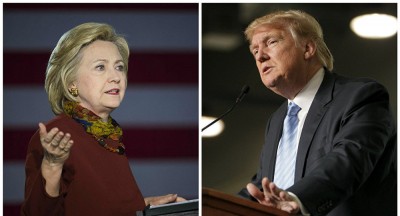On the Eve of the Vote: Trump Values, Islam and Militias

The chugging train of fear continues to drone away on the eve of what has been considered one of the most important elections in generations. Mind you, this was the sort of stuff spouted during the campaigns of 2008, when a disgusted electorate washed a mouth contaminated by George W. Bush’s years with Barack Obama’s honeyed promises.
Eight years after that wash, and other antidotes and options are being sought in the supermarket of populism. It is precisely this sort of enthusiastic shopping that terrifies and torments, notably various groups who see a Trump presidency as the demon incarnate.
This take is particularly strong regarding the Muslim-American community. With a persistent fear that Islamic fundamentalism will take root in US soil with weed-like tenacity, Trump’s messages strike an appealing note. It is the rise of Trump that prompts such touchy headlines as that of Al Jazeera: “American Muslims brace for the worst after US election.”
Instances of planned attacks and foiled plots against Muslim communities abound. The FBI revealed last month that it had frustrated the efforts of a Kansas militia to eliminate a Somali Muslim mosque and community centre by way of detonation in Garden City.
Researchers such as Ryan Lenz of the Southern Poverty Law Centre insist that disparate groups are coalescing in Trump’s America, and not in a good way for various, fearful minorities. “In the aftermath of September 11, white nationalist groups teamed up with organised anti-Muslim groups, creating a dangerous and threatening alliance against members of the American Muslim community.”
Not all of this should be laid at the feet of Trump malignancy; in the United States, visions of utopia and promised land rhetoric have mingled with crude realities and hatreds long before The Donald held sway. In typically crude businesslike fashion, he has marketised such fear.
The suspicions in some communities towards Islam’s endeavours are simply cognate realities that have found form in other countries, suggesting that the US, despite its melting pot credentials, is not immune.
Insecure, macho and pricelessly juvenile (the mix is standard), militia groups have also promised to protect a vision of the US that pre-dates Trump. What matters here is the logic of repair that Trump has appropriated: the system is broken, and these are your patriotic handymen charging to the rescue.
Georgia Force III%, sounding more like a name given to an industrial solvent, is one such example. In this case, it is a militia outfit led by Chris Hill. Having given himself the rather longwinded title of Security Force Commander, Hill claimed that, “We have to be prepared to protect the country from all enemies foreign and domestic.” A loss of “control” on various “fronts” had put American “liberties” and “freedoms” at risk.[1] His solution? Conducing armed manoeuvres in the woods.
The language of vote rigging has also found a home in discussions about the credibility of the electoral system itself. While the arguments have merit in so far as they go to the core of how democracy is defined, the critique offered by many of Trump’s supporters is scatty. In order to avoid rigging, a form of intimidation via excessive scrutiny, for instance, has been suggested.
In other instances, it has seen a surge of Republican volunteers wishing to serve as poll watchers. Given the shoddiness in the management of some polling stations across this vast country, the concerns are not without merit. In a narrow election result, missing or miscounted ballots can prove a costly thing to the losing side.
What concerns such individuals as former US attorney general Alberto Gonzales, remembered for having a hand in the debates on torture during the Bush administration years, is the overly enthusiastic nature of the private response. “I would depend on the state and local officials to make sure of the integrity of the vote within particular precincts.”[2]
It is exactly such statements, said without irony, that make the private efforts of overly zealous citizens so potent. Officialdom, with rules it supposedly follows yet breaks, is to be mistrusted. The Democratic Party, in various quarters, has insisted on its own reading of those rules, with the Ohio Democrats claiming in a lawsuit that their Republican counterparts in the state, along with the Trump campaign and Stop the Steal, have effectively suppressed minorities in urban areas from going to the polls. A sense of paranoia across the entire spectrum abounds.
What is clear is that such fears do have a habit of becoming self-fulfilling prophecies. The threats of armed militias to carry arms to polling stations ostensibly to prevent rigging revives images more akin to Mugabe’s Zimbabwe than the United States: to make sure a result is fair is merely code to make sure the result is fair to us.
This election campaign has shown that a lack of noble spirit and generosity can get you elected in efforts of sheer disgust. The only uncertainly as the queues gather is to what extent disgust and fear translates into votes. Not even a smug Nate Silver would be able to predict that.
Dr. Binoy Kampmark was a Commonwealth Scholar at Selwyn College, Cambridge. He lectures at RMIT University, Melbourne. Email: [email protected]
Notes
[1] http://www.wsbtv.com/news/local/georgia-militia-group-preparing-for-potential-unrest-following-election/464109332
[2] https://www.theguardian.com/us-news/2016/nov/05/election-day-violence-donald-trump-poll-watchers

